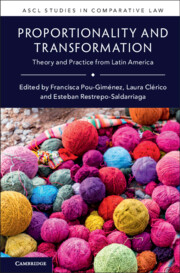Book contents
- Proportionality and Transformation
- Ascl Studies in Comparative Law
- Proportionality and Transformation
- Copyright page
- Contents
- Editors
- Contributors
- Acknowledgments
- Introduction
- Part I Proportionality and Processes of Constitutionalization
- Part II Proportionality in Social Rights and Equality-Based Adjudication
- 6 Socioeconomic Rights in the Colombian Constitutional Jurisprudence
- 7 Progressive Realization, Nonretrogression and Maximum of Available Resources
- 8 The Use of Proportionality by the Inter-American Court in Equality and Nondiscrimination Cases
- 9 Transformation and Its Limits
- Part III Proportionality, between Transformation and the Status Quo
- Index
8 - The Use of Proportionality by the Inter-American Court in Equality and Nondiscrimination Cases
from Part II - Proportionality in Social Rights and Equality-Based Adjudication
Published online by Cambridge University Press: 27 October 2022
- Proportionality and Transformation
- Ascl Studies in Comparative Law
- Proportionality and Transformation
- Copyright page
- Contents
- Editors
- Contributors
- Acknowledgments
- Introduction
- Part I Proportionality and Processes of Constitutionalization
- Part II Proportionality in Social Rights and Equality-Based Adjudication
- 6 Socioeconomic Rights in the Colombian Constitutional Jurisprudence
- 7 Progressive Realization, Nonretrogression and Maximum of Available Resources
- 8 The Use of Proportionality by the Inter-American Court in Equality and Nondiscrimination Cases
- 9 Transformation and Its Limits
- Part III Proportionality, between Transformation and the Status Quo
- Index
Summary
Proportionality has been a recurrent method of adjudication in the Inter-American Human Rights System in different types of cases – mainly, in cases of limitations of human rights and in cases of equality and nondiscrimination. This chapter focuses on the use of proportionality by the Inter-American Court in the second group of cases. First, the chapter addresses the complexity of equality and nondiscrimination positive provisions, with specific emphasis on the formulas employed by the American Convention on Human Rights. Second, it discusses the type of cases in which proportionality is useful and serves its purpose of narrowing discretion in the adjudication of equality and nondiscrimination provisions, which are those involving direct discrimination. It also presents reasons to be skeptical about the usefulness and appropriateness of proportionality in the adjudication of other types of cases, specifically those dealing with covert and indirect discrimination. The analysis also discusses the potential use of proportionality in other cases related to the substantive dimension of equality and nondiscrimination.
Keywords
Information
- Type
- Chapter
- Information
- Proportionality and TransformationTheory and Practice from Latin America, pp. 185 - 204Publisher: Cambridge University PressPrint publication year: 2022
